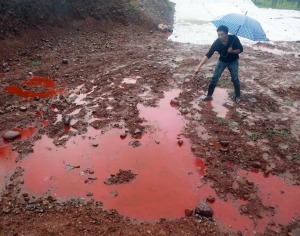Image: A man points to water and soil which turned red after being contaminated by industrial waste from a closed dye factory, amid heavy rainfall at a mountain in Ruyang county, Henan province September 15, 2014. REUTERS/Stringer
![]()
BEIJING (Reuters) – China aims to pass its first soil pollution law next year hoping to tackle a “serious” problem that so far lacks dedicated legislation, a senior Chinese official said on Thursday.
China’s government declared war on pollution in 2014 in a bid to head off rising public anger over the environmental costs of rapid growth.
It is under particular pressure to reduce the risk of contaminated crops entering the food chain, with farming on 3.3 million hectares (8.15 million acres) across China already being banned indefinitely.
There have been repeated food scandals, especially rice, a staple for hundreds of millions in China, being contaminated with heavy metals like lead and cadmium.
“Looking at the results of soil pollution surveys from relevant departments of the State Council, our country’s soil pollution situation is generally speaking serious and it’s not easy to be optimistic. Some areas are seriously polluted,” said Yuan Si, deputy head of parliament’s Environmental Protection and Resources Conservation Committee.
The problem directly affects food and water safety and whether or not the country is able to develop in a sustainable way, Yuan told reporters on the sidelines of China’s annual meeting of parliament.
“The basis for our country’s soil pollution prevention work is weak. There are no specialized laws, meaning government bodies lack a legal basis for effective supervision, so it really needs legislation to resolve,” he added.
China already has air and water pollution laws, but it is a “blank slate” for soil pollution, Yuan added.
The soil pollution law has been through 10 drafts already and will be submitted to parliament’s Standing Committee in 2017 to be put on the legislative agenda, he said.
Agriculture Minister Han Changfu, speaking on Monday, said about 1 percent of polluted land was seriously polluted.
People who were consulted on a draft of the legislation previously told Reuters in 2014 that it will allow the state to decide who is responsible for contaminated land, as well as creating new financing mechanisms to pay for the clean-up.
Such mechanisms are expected to involve the establishment of dedicated new funds for cleaning up, as well as subsidy and loan facilities to help cover treatment costs.
It is not clear if those provisions remain in the current draft of the law.
(Reporting by Ben Blanchard; Additional reporting by David Stanway in BEIJING; Editing by Christian Schmollinger)
Copyright 2015 Thomson Reuters. Click for Restrictions.
Amid-serious-situation-China-eyes-soil-pollution-law-in-2017-media.jpg


